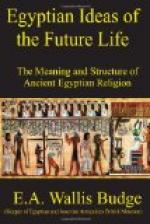for an indefinite period. The Coptic lives of
saints and martyrs are full of allusions to the sufferings
of the damned, but whether the descriptions of these
are due to imaginings of the mind of the Christian
Egyptian or to the bias of the scribe’s opinions
cannot always be said. When we consider that the
Coptic hell was little more than a modified form of
the ancient Egyptian Amenti, or Amentet, it is difficult
to believe that it was the name of the Egyptian underworld
only which was borrowed, and that the ideas and beliefs
concerning it which were held by the ancient Egyptians
were not at the same time absorbed. Some Christian
writers are most minute in their classification of
the wicked in hell, as we may see from the following
extract from the life of Pisentios, [Footnote:
Ed. Amelineau, Paris, 1887, p. 144 f.] Bishop of Keft,
in the VIIth century of our era. The holy man
had taken refuge in a tomb wherein a number of mummies
had been piled up, and when he had read the list of
the names of the people who had been buried there
he gave it to his disciple to replace. Then he
addressed his disciple and admonished him to do the
work of God with diligence, and warned him that every
man must become even as were the mummies which lay
before them. “And some,” said he,
“whose sins have been many are now in Amenti,
others are in the outer darkness, others are in pits
and ditches filled with fire, and others are in the
river of fire: upon these last no one hath bestowed
rest. And others, likewise, are in a place of
rest, by reason of their good works.” When
the disciple had departed, the holy man began to talk
to one of the mummies who had been a native of the
town of Erment, or Armant, and whose father and mother
had been called Agricolaos and Eustathia. He had
been a worshipper of Poseidon, and had never heard
that Christ had come into the world. “And,”
said he “woe, woe is me because I was born into
the world. Why did not my mother’s womb
become my tomb? When, it became necessary for
me to die, the Kosmokrator angels were the first to
come round about me, and they told me of all the sins
which I had committed, and they said unto me, ’Let
him that can save thee from the torments into which
thou shalt be cast come hither.’ And they
had in their hands iron knives, and pointed goads
which were like unto sharp spears, and they drove
them into my sides and gnashed upon me with their teeth.
When a little time afterwards my eyes were opened
I saw death hovering about in the air in its manifold
forms, and at that moment angels who were without
pity came and dragged my wretched soul from my body,
and having tied it under the form of a black horse
they led me away to Amonti. Woe be unto every
sinner like unto myself who hath been born into the
world! O my master and father, I was then delivered
into the hands of a multitude of tormentors who were
without pity and who had each a different form.
Oh, what a number of wild beasts did I see in the way!




